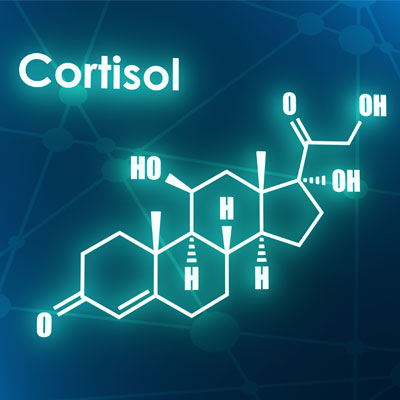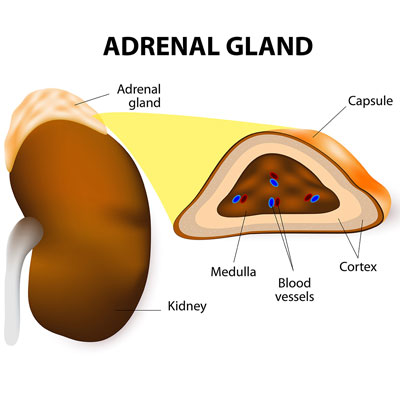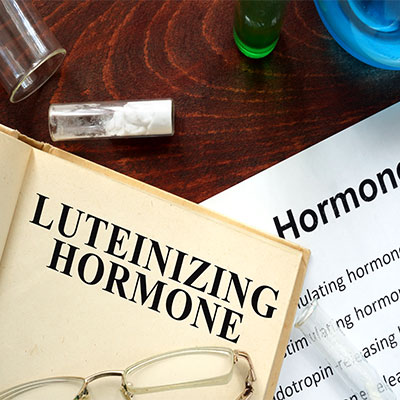Contents
- What is Cortisol?
- What Does Cortisol Do?
- Signs and Symptoms of a Cortisol Imbalance in Women
- What if a Woman’s Cortisol is Too High?
- How Does Low Cortisol Affect Women?
- How to Diagnose Low or High Cortisol
- How Are Cortisol Imbalances in Women Treated
- What Does the Medical Research Say About Women and Cortisol?
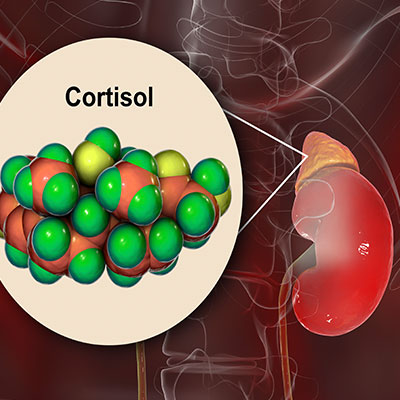
Cortisol has been called the “stress hormone” because it is released as the body’s natural response to stress; however when it comes to a woman’s health and her overall hormonal balance, cortisol plays a much more significant role.
What is Cortisol?
Cortisol is a glucocorticoid hormone that plays several important roles. It helps control how your body metabolizes fats, proteins, and carbohydrates. It is instrumental in your immune response in the suppression of inflammation. Cortisol also regulates blood pressure, increases blood sugar, has an impact on bone density, and helps to regular sleep. It is also fundamental to your body’s “fight or flight” response.
Cortisol regulates many body processes. It is one of your most critical “chemical messengers,” so much so that practically every cell in your body has cortisol receptors and every cell in your body reacts to the presence of or lack of cortisol in your bloodstream.
Your hypothalamus and pituitary gland work together to monitor if your blood contains the right level of cortisol. If the level is too low, your brain adjusts the amount of hormones it makes and releases.
Cortisol receptors receive and use the hormone in different ways. Your needs will differ from day today. For instance, when your body is on high alert, cortisol can alter or shut down functions that get in the way. These might include your digestive or reproductive systems, your immune system, or even your growth processes.
Sometimes, your cortisol levels can get out of control leading to periods of too much or too little cortisol in the blood.
What Does Cortisol Do?
Cortisol is your body’s main stress hormone. It is produced by the adrenal glands. Cortisol plays an important role in a number of things your body does. For instance, it:
- Manages how your body uses carbohydrates, fats, and proteins
- Keeps inflammation down
- Regulates your blood pressure
- Increases your blood sugar (glucose)
- Controls your sleep/wake cycle
- Boosts energy so you can handle stress and restores balance afterward
Signs and Symptoms of a Cortisol Imbalance in Women
Normal cortisol levels for women for a blood sample taken at 8 in the morning are 5 to 25 mcg/dL or 140 to 690 nmol/L. Normal values depend on the time of day and the clinical context. Normal ranges may vary slightly among different laboratories. Some labs use different measurements or may test different specimens.
If your cortisol levels are imbalanced, it can through off any number of your body’s most important functions. It can also lead to a number of health problems, including but not limited to:
- Anxiety and depression
- Headaches
- Heart disease
- Memory and concentration problems
- Problems with digestion
- Insomnia or other sleep disorders
- Weight gain
- Weakened immune system
- Acne
- Thinning hair
- Bruising and slow wound healing
- Weak bones
- Muscle weakness
- Low libido of sex drive
- High blood sugar
- Irregular periods
- difficulty concentrating
What if a Woman’s Cortisol is Too High?

Adrenal fatigue is a term applied to a collection of nonspecific symptoms, such as body aches, fatigue, nervousness, sleep disturbances, and digestive problems. The term “adrenal fatigue” was coined in 1998 by James Wilson, Ph.D., a naturopath and expert in alternative medicine. He describes it as a “syndrome” that results “when the adrenal glands function below the necessary level.”
The root cause of adrenal fatigue is stress. Our doctors understand that adrenal fatigue is a condition caused by overstimulation of the adrenal glands due to long-term stress. When you are overstressed, the adrenals release too much cortisol. Cortisol lowers your testosterone levels, which adds to many of the problems associated with adrenal fatigue.
In addition to Adrenal fatigue, elevated cortisol hormone levels in women can lead to Cushing’s disease. Cushing’s is a condition that results in thinning and bruising of the skin, obesity, diabetes, psychiatric disturbances, high blood pressure, muscle weakness, osteoporosis, excessive facial hair, and irregular periods in women. Patients with cortisol excess also have impaired wound healing and an increased susceptibility to infection.
How Does Low Cortisol Affect Women?
Lower than normal cortisol levels can lead to a condition known as Addison’s disease. Addison’s disease due to insufficient cortisol production can cause a number of health problems including, low blood pressure, fatigue, weight loss, anorexia, nausea, vomiting, abdominal pain, salt craving, and low blood sugar.
The onset of symptoms of low cortisol causing Addison’s is often very gradual. Symptoms may include fatigue, dizziness (especially upon standing), weight loss, muscle weakness, mood changes, and the darkening of regions of the skin.
Without treatment proper treatment Addison’s disease is a potentially life-threatening condition.
Though rare, both Addison’s disease and Cushing’s disease are serious conditions that can be caused by cortisol imbalances.
How to Diagnose Low or High Cortisol
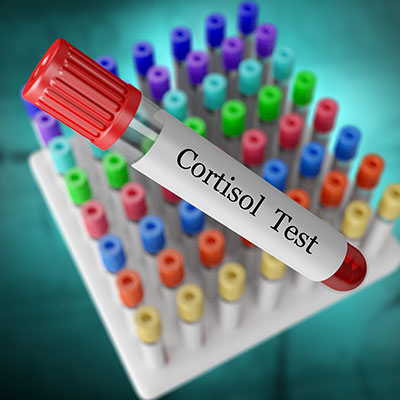
Once your cortisol level is determined, the proper course of treatment will be recommended.
How Are Cortisol Imbalances in Women Treated
Depending on the nature of the cortisol imbalance will determine the course of treatment. As you might imagine, high cortisol levels in women and low cortisol levels in women are treated differently.
There is no one specific treatment for cortisol issues in women. Treatments will be designed to target the root causes. Lifestyle changes and supplementation may be recommended to reduce stress and cortisol release. Hormone replacement may be used to bring hormones back into harmony that were thrown into imbalance by the increased production of cortisol due to adrenal fatigue.
What Does the Medical Research Say About Women and Cortisol?
Most of the medical research on cortisol revolves around its relationship to stress.
A Trusted sourceEffect of increase in cortisol level due to stress in healthy young individuals on dynamic and static balance scoresNCBIGo to source2018 study found, “The mean cortisol level was found to increase approximately 9 times in stressful periods compared with that in relaxed periods. STAI, which shows state anxiety, showed an increase supporting this increase.”
The purpose of this study was to examine the effects of cortisol level, which increases in healthy young individuals due to stress, on dynamic and static balance scores as well as to present the results caused by high levels of stress.
Another Trusted sourceCirculating cortisol and cognitive and structural brain measuresNeurology® journalsGo to source2018 study , this one published in Neurology, found that increased stress leading to higher than normal cortisol levels leads to an increased risk of early onset of cognitive issues, including Alzheimer’s. The study found those with the highest levels of the stress-related hormone cortisol performed worse on tests of memory, organization, visual perception, and attention. The effect was found to be more common in women than in men.
A Trusted sourceSex and stress: Men and women show different cortisol responses to psychological stress induced by the Trier Social Stress Test and the Iowa Singing Social Stress TestNCBIGo to source2017 study found that men and women react differently to stress, which leads to variability in cortisol secretion in response to stressful situations. The study found that when using two specific indicators of the stress response, men showed a more robust response to both tasks, and women displayed a smaller response.
Another Trusted sourceA low cortisol response to stress is associated with musculoskeletal pain combined with increased pain sensitivity in young adults: a longitudinal cohort studyNCBIGo to source2017 study found that low cortisol is associated with a higher degree of musculoskeletal pain. The study suggested that a hyporesponsive HPA axis (low levels of cortisol) is associated with increased musculoskeletal pain and overall increased pain sensitivity in young men and women at ages 18 and 22, respectively.
Now that you know a lot more about cortisol and women, why not contact us and learn more about the many life-changing benefits of hormone therapy for women?
FAQ
What is Cortisol?
Cortisol is a steroid hormone that regulates a wide range of vital processes throughout the body, including metabolism and the immune response. It also has a very important role in helping the body respond to stress.
What Can Happen if Your Cortisol Level Is Too High?
If your body is making too much cortisol for some reason, it can cause a condition called Cushing syndrome. It can also lead to rapid weight gain, skin that bruises easily, muscle weakness, diabetes, and many other health problems.
Are There Certain Foods That Can Increase Cortisol Levels
Yes, there are several foods that can contribute to higher than normal cortisol levels. Eating foods such as processed meats, high sugar foods, caffeine, and alcohol not only have little nutritional value and can cause a wealth of other health problems but also have been associated with an increased cortisol level leading to increased stress and anxiety.
What Causes High Cortisol Levels?
A number of things can cause high cortisol levels, including:
- Physical and emotional stress
- Certain medications
- Adrenal tumor or other disease or condition impacting adrenal function
- A pituitary gland issue
- Poor nutrition
What Should I Do if My Cortisol Levels Are Too High?
If your cortisol levels are high, how you lower them will depend on the underlying cause. If it's because of issues with your pituitary gland, adrenal glands, or medication you're taking, you'll need to work with your doctor to lower them. If it's because of chronic stress, you will need to take action to reduce stress in your life; if your cortisol levels are high due to poor nutrition, you will have to work with your healthcare professional to make dietary changes.



